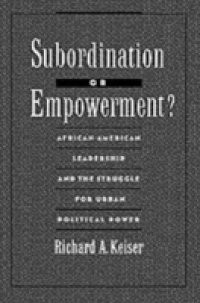Why have Blacks won political empowerment in some cities and in others remained subordinated or had their achievements rolled back? Why do some cities have many Black leaders with multi-racial appeal while other cities have none? Subordination or Empowerment answers these questions through detailed historical examinations of the Black struggle for political power in Chicago, Gary, Philadelphia, and Atlanta. Keiser argues that electoral competition among White factions has created opportunities for Black leaders to win genuine political empowerment and avoid subordination. When electoral competition among Whites does not exist, Black votes lose their electoral leverage, leading to the rise of extra-electoral strategies. Keiser's dynamic theory of leadership formation explains the current appeal of Black separatism and messianism at the local and national levels and the consequent rise of leaders such as Louis Farakhan, and offers a rejoinder to Cornel West's critique of Black leadership in Race Matters.




















